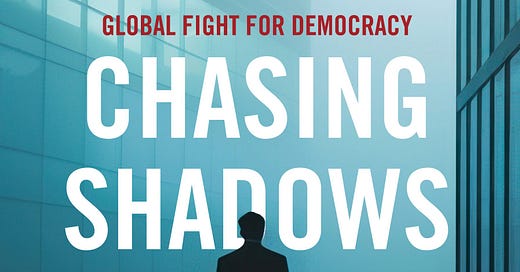The Q&A: Ron Deibert on the Wild Wild Web
The Citizen Lab founder on "rattling the cages of some very powerful entities"
I haven’t seen a book in a while that does so much to confirm my worst hunches as Chasing Shadows: Cyber Espionage, Subversions, and the Global Fight for Democracy. Its author, Ronald Deibert, is the founder and director of the Citizen Lab at the University of Toronto’s Munk School.
For more than a quarter-century, Deibert has led a team of digital investigators who track, and often foil, attempts by shady firms and governments to turn today’s digital technology against its owners.
Your phone rings, but later there’s no record of a call. But now a bit of code, installed almost without a trace, recruits your phone’s microphone, camera and GPS to track your every move. Citizen Lab’s work tracking such schemes helped end the careers of spy-agency chiefs in Spain and Greece. Deibert says similar technology is used routinely to intimidate Canadian residents by governments in their home countries.
Chasing Shadows isn’t Deibert’s first book-length wakeup call — he won the Shaughnessy Cohen prize for the book of his 2021 Massey Lectures, RESET — but if anything, his warnings have taken on a new urgency. In a world where might is working overtime to make right, it’s important to know what tools are available to the figures in the shadows.
Paul Wells: Your book's called Chasing Shadows. I get the impression the shadows are winning?
Ronald Deibert: We've had some significant victories. [But] generally speaking, the overall climate looks very bad, for not only this area — the mercenary surveillance industry and all of the harms related to it — but the rapid descent into authoritarianism that we're all observing these days.
PW: Your book talks about all the different ways that my cell phone or my laptop can be weaponized against me. You start with some astonishing anecdotes about people who didn't even notice that this spyware had been installed in their phones and they were now under surveillance.
Deibert: Intelligence agencies were always looking for ways to gather information over the latest means of communication, going back to the telegraph, and even before that. Now people carry these devices around with them, mostly 24 hours a day, sitting on their bedside tables. And they're designed to be invasive because of the business model around most of social media and the internet. They're obviously very appealing targets.
There's been a progression of surveillance techniques, and the industry behind this is another part of the story. Basically you have off-the-shelf signals-intelligence capability being marketed to government clients around the world. And of course, some of the government clients are some of the world's worst autocrats and dictators. Even liberal-democratic states have abused this type of technology. It's extremely powerful, and some extremely invasive services are being supplied to secretive government agencies. What we’ve been doing is rolling up — through this kind of very careful, evidence-based research — thousands of cases of abuse.




